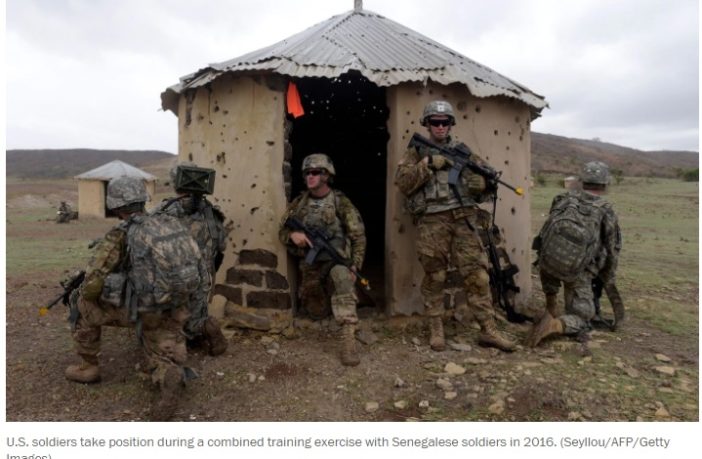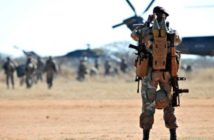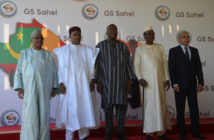Washington Post
By Dan Lamothe and Danielle Paquette
The defense secretary believes European allies can lend more help, a senior Pentagon official said.
The Pentagon is facing growing pressure from Congress to maintain U.S. troop levels in Africa as the Defense Department considers significantly reducing the American presence to refocus on the Asia-Pacific region.
Defense Secretary Mark T. Esper has undertaken a review of each geographic combatant command, its missions and assignments, and will assess whether allies and partner nations can take on more responsibilities, said Jonathan Hoffman, the chief Pentagon spokesman.
The review began with the region under U.S. Africa Command, which includes the entire continent except for Egypt, which falls under U.S. Central Command. President Trump has said that he wants to get the United States out of “ridiculous Endless Wars, many of them tribal, and bring our soldiers home.”
Although Pentagon officials say no decisions have been made, the effort has generated a rising bipartisan tide of concern that the United States will cede influence to rival nations such as Russia and China and do less to counter extremist groups with links to al-Qaeda and the Islamic State.AD
“Any drawdown of our troops would be shortsighted, could cripple Africom’s ability to execute its mission and, as a result, would harm national security,” said Sen. James M. Inhofe (R-Okla.), chairman of the Senate Armed Services Committee, who has generally been a strong supporter of the Trump administration.
Sen. Lindsey O. Graham (R-S.C.), another Trump ally, also raised the issue in a letter to Esper that expressed “serious concern regarding reports of a possible decision to significantly reduce or completely withdraw U.S. Armed Forces,” especially in West Africa. The letter was co-signed by Sen. Christopher A. Coons (D-Del.).
The cuts are under consideration as high-profile attacks by militants from Niger to Kenya have rattled nerves and raised concerns about stability and security. On Jan. 5, one U.S. service member and two U.S. contractors were killed in an attack carried out by the Somali militant group al-Shabab on an airfield in Kenya, highlighting the group’s ability to extend beyond Somalia.AD
But the Pentagon for two years has signaled a national defense strategy that emphasizes shifting to the Asia-Pacific region to better counter Russia and China, pushing counterterrorism down on the list of priorities.
Esper has described the strategy as “our guiding beacon.” But he has also deployed thousands of additional service members to the Middle East following months of turmoil with Iran, including a U.S. drone strike this month that killed an Iranian military commander blamed for the deaths of hundreds of U.S. service members. The death of Maj. Gen. Qasem Soleimani and retaliatory attacks by Iran on bases housing U.S. forces in Iraq briefly raised the specter of open warfare.
The Pentagon has about 6,000 troops in Africa, including about 1,400 in West Africa, primarily in Niger, said Air Force Col. Chris Karns, a military spokesman. Some 4,400 are in East Africa, with most in Djibouti, and between 650 and 800 in Somalia, where the U.S. military advises African forces combating al-Shabab.AD
A senior defense official, who like several other officials interviewed for this story spoke on the condition of anonymity because of the sensitivity of the issue, said that changes in Africa could include a greater reliance on a concept the Pentagon calls “dynamic force employment,” in which troops are moved with little notice to demonstrate a U.S. presence and unpredictability. The Pentagon has used that model to do things such as showcase an aircraft carrier, but it is unclear how well it will apply in Africa, where small teams of service members are often distributed across large areas.
Another senior defense official said that although no decisions have been made, Esper has concerns about past “mission creep,” in which efforts gradually expand because service members already are deployed. Esper believes European allies can take on additional missions and allow the Pentagon to focus more elsewhere, the senior official said.
“The thing we always look at it is: Do our goals support the NDS,” the official said, referring to the national defense strategy. “We are doing drastic prioritization of all of our assets and all of our personnel on where they are best utilized to support the NDS and the national interests.”AD
Army Gen. Stephen Townsend, the Africa Command chief, will visit Washington this week for previously scheduled meetings at the Pentagon and on Capitol Hill, two defense officials said. But the cuts, first reported by the New York Times last month, are sure to be discussed.
The issue has also caught the attention of the French government, which has about 4,500 troops deployed to Mali and nearby nations and relies on American support for intelligence, transportation, surveillance and aerial refueling to fight extremists.
French Defense Minister Florence Parly said recently that she will travel to Washington this month amid growing concern that the United States could withdraw forces. French President Emmanuel Macron announced Jan. 13 that he is sending hundreds more troops to West Africa and urged other European countries to join the battle, expressing alarm over the prospect of losing the “irreplaceable” help of the U.S. military.AD
Concerns about a U.S. withdrawal have grown, and Western officials say the Sahel region, which lies south of the Sahara Desert, risks becoming an expansive refuge for terrorists planning attacks worldwide.
Militants linked to the Islamic State and al-Qaeda have chased hundreds of thousands of people from their homes in recent months, rendering once-peaceful communities uninhabitable as they kill indiscriminately.
Clashes in these rural stretches of Mali, Niger and Burkina Faso have surged fivefold since 2016, according to the Africa Center for Strategic Studies in Washington, prompting fears the violence could spread.
Fourteen people, mostly children, died earlier this month in northern Burkina Faso when their bus rolled over a roadside bomb. Eighty-nine soldiers were killed in western Niger a week later after suspected terrorists ambushed an army base for the second time in as many months, staging the deadliest strike on the country’s security forces in recent memory.AD
Islamist militants in the Sahel are “radicalizing locals and importing what one human rights organization described as ‘unmitigated cruelty and utter disregard for human life,’” said Andrew Young, the U.S. ambassador to Burkina Faso.
Extremist groups that previously clashed with one another now appear to be working together, U.S. and European officials say.
Sahelian leaders are pouring a collective $1 billion into the fight and expanding military recruitment efforts on some of Earth’s harshest terrain. The United Nations has roughly 14,000 peacekeepers in Mali, which is considered the epicenter of the conflict.
A senior military officer with Africom, Army Maj. Gen. William Gayler, played down the significance of the Pentagon’s review, calling it “nothing more than an assessment of globally aligning resources” to the U.S. defense strategy. However, he indicated that growing security concerns in Africa complicate it.AD
“I would think if you have a problem that’s potentially growing and you do less, it’s not going to be helpful,” Gayler said in a phone conference with reporters on Thursday. “That’s logical. That’s not the intent.”
On Capitol Hill, lawmakers have pushed for more details about what the plan might include.
On Tuesday, a bipartisan group in the House sent a missive to Esper arguing that a “narrow focus on confronting Russia and China in great power competition is a shortsighted action.” Doing so, “diminishes our overall national security posture and our ability to lead with American values and influence,” lawmakers wrote.
Rep. Anthony G. Brown (D-Md.), one of the co-signers, said that before visiting Mali, Niger and Nigeria last summer with three other lawmakers, he believed the United States should reduce its troop presence in Africa. But after seeing how U.S. Special Operations forces and aid workers collaborate to provide stability and an American foothold on the continent, he now thinks a modest increase makes more sense, he said.AD
“It’s really just preserving relationships and making sure that China, particularly, does not become a partner out of necessity,” Brown, a retired Army officer, said in an interview.
Rep. Michael Waltz (R-Fla.), a retired Green Beret officer who also signed the letter, said that although he agrees the Pentagon must prepare for competition with China and Russia, he worries the “pendulum can swing too far” from counterterrorism and stability operations.
He cited Russian involvement in Libya and the possibility of the Russian military gaining a port there.
“I’m looking at a small footprint and what it costs us now versus what it could cost us in the long run by pulling back,” he said.
Donald Bolduc, a retired Army general who commanded U.S. Special Operations in Africa, questioned whether the Pentagon can reallocate resources without leaving Africom shorthanded, citing his own experiences before retiring in 2017.
Bolduc, who is running for U.S. Senate in New Hampshire as a Republican, said that at one point, Africom had three surveillance aircraft for the entire continent, while the Pentagon had dedicated more than 100 to the Middle East and Afghanistan.
“It was like … ‘I’m fighting the same guys that you’re fighting! This is nuts!’” he said. “And it was the same thing with medical and personnel recovery. We had to balance those things and shift them around.”
Paquette reported from Ouagadougou, Burkina Faso.4 CommentsHomeShare4Dan LamotheDan Lamothe joined The Washington Post in 2014 to cover the U.S. military and the Pentagon. He has written about the Armed Forces for more than a decade, traveling extensively, embedding with each service and covering combat in Afghanistan numerous times.FollowDanielle PaquetteDanielle Paquette is The Washington Post’s West Africa bureau chief. Before becoming a foreign correspondent in 2019, she spent five years writing about labor, gender and the economy.Follow







